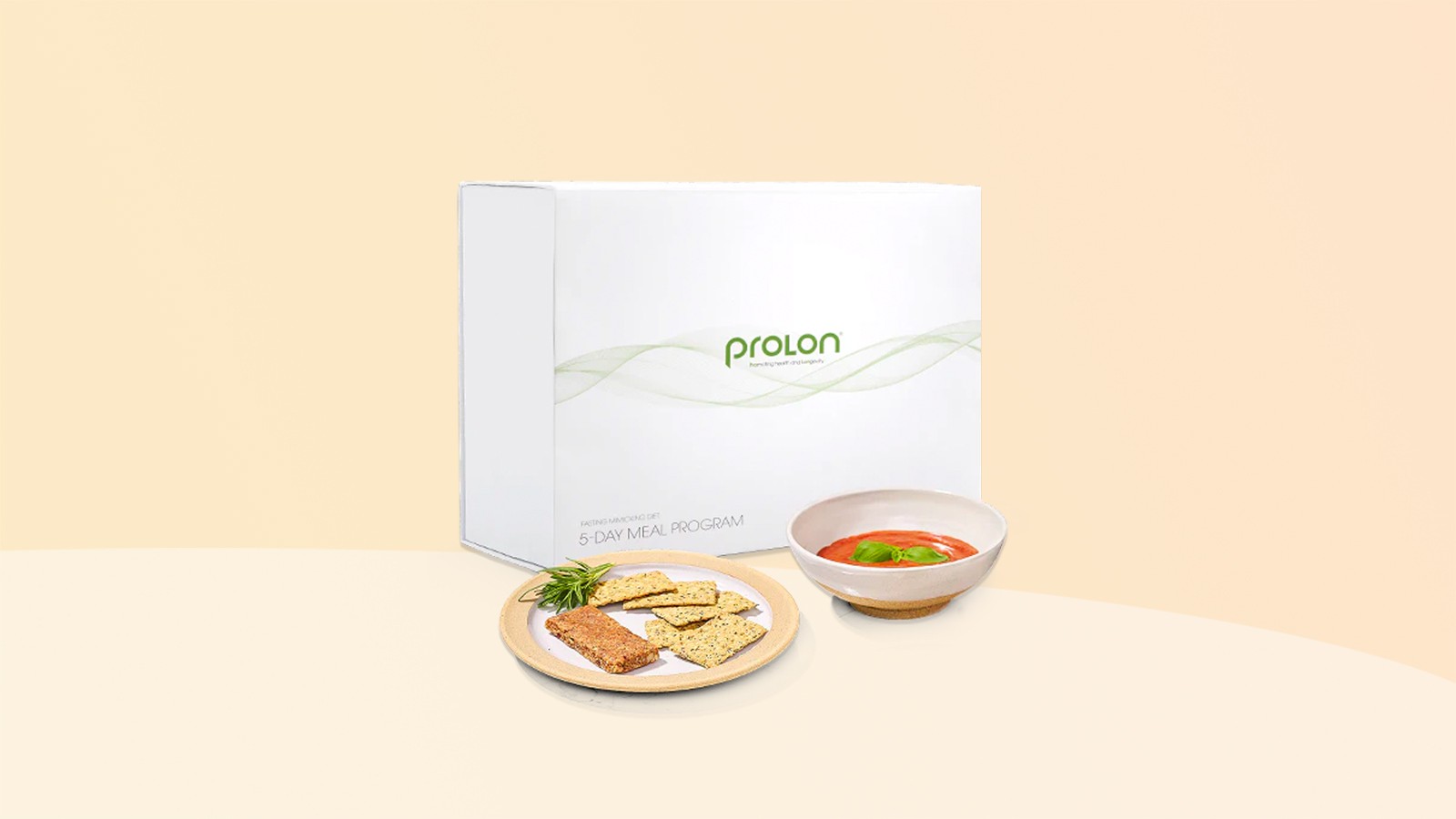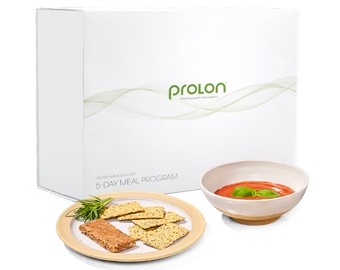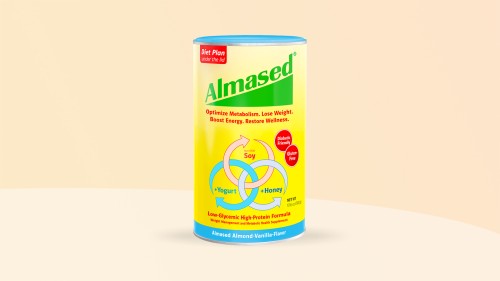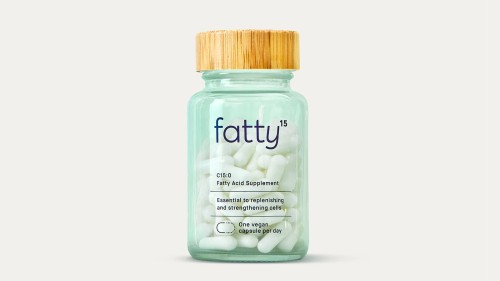WellnessVerge is reader-supported. We may earn a commission when you make a purchase through the links on this page. Learn more about our process here.
ProLon Fasting Diet Review: Get the Benefits of Fasting Without Eliminating Food
Last Updated on September 3, 2023
ProLon is a fasting-mimicking diet that uses specific foods to obtain the health benefits of fasting without completely eliminating food. There is significant evidence that this diet may improve overall health, but there are also important considerations to keep in mind.

Key Insights (TL;DR)
- ProLon is a fasting-mimicking diet scientifically designed meal plan that uses specific combinations and quantities of foods to achieve the health benefits of fasting without actually fasting.
- It can be a good alternative to more restrictive forms of fasting that come with unpleasant symptoms. ProLon can help you reap the benefits of fasting without eliminating all foods.
- The program's main aim is to promote longevity by speeding up autophagy. Autophagy is a natural process in the body that helps clean up waste in the cells, optimizing their performance. It is also being studied for its role in preventing disease and its connection to aging and longevity.
- ProLon was developed by Dr. Valter Longo based on numerous studies and years of research. There is significant evidence indicating that this program might improve overall health.
- There are no other diets that work in the same way as ProLon, making it a truly one-of-a-kind, evidence-based program.
What We Like About ProLon
- ProLon was designed by a leading expert based on 20 years of research.
- This diet provides possible health benefits backed by solid scientific data.
- This diet is an alternative to more restrictive forms of fasting.
- ProLon offers coach-led fasting groups to help you optimize the results.
Important Considerations
- Eating pre-packaged food out of a box may take some getting used to.
- The low-calorie program may be uncomfortable for some people.
- Even with its unique combination of nutrients, ProLon may produce some uncomfortable symptoms associated with fasting, including fatigue and feeling “hangry”.
- Fasting may provide some moderate to mild weight loss benefits, but it has not been studied long-term, and should not be used as a long-term sustainable solution.
ProLon at a Glance
Fasting has been a popular topic of discussion and research in recent decades, and for a good reason. It can promote weight loss, help manage diabetes, and even improve heart health. Yet despite its promising benefits, not many people can make it a part of their lifestyle.
Unpleasant symptoms are one common reason. For many, fasting is associated with hunger, headaches, fatigue, and muscle loss.
Enter ProLon fasting-mimicking diet. ProLon is the first meal program of its kind that allows you to get the benefits of fasting while still eating real food. The diet was developed by a well-respected health researcher Dr. Valter Longo, the director of the Longevity Institute at the University of Southern California.
The ProLon diet is based on Dr. Longo’s research about how cells sense food or what is referred to as “nutrient-sensing pathways.” With this understanding, he developed a formulation that “tricks” the cells into thinking there is no food available and that the body is fasting. In theory, this allows you to get all the benefits of fasting without actually fasting.
The main goal of ProLon is to increase longevity and health by speeding up the clean-up of harmful cells and debris in the body, a process called autophagy.
Possible benefits of ProLon include:
- Promoting cellular renewal
- Supporting metabolic health
- Enhancing clarity and performance
- Promoting fat focused weight loss
Fun Fact: ProLon stands for “Promoting Longevity and Healthspan.”
How ProLon Works and What You Eat
ProLon involves a 5-day meal program that combines macronutrients (proteins, fats, and carbs) in precise, researched-based quantities that will nourish your body but will keep you fasting and going through autophagy.
At the program's start, you receive a kit of plant-based, gluten-free packaged food that includes a combination of soups, supplements, drink mixes, and tea. The kit's contents are separated into five boxes, one for each day of the program.
The diet provides 1,090 calories on the first day and 725 calories daily for the next four days. It is designed to meet 34–54% of your normal calorie intake.
For 5 days, you eat only the food provided in the boxes, eliminating the need to prep and cook. Some of the foods you might eat on the ProLon diet include:
- Plant-based soups, like minestrone and tomato
- Kale crackers
- ProLon snack bars
- Appetite suppressing drinks
- Olives
- Teas
- A variety of multivitamins, omega-3 fatty acids, and other supplements
After the 5 days, you are supposed to ease back into regular meals a little at a time. For optimal results, it is recommended that you do three cycles of ProLon for three consecutive months. To maintain the benefits, it is suggested to repeat the program once every 1–6 months.
Benefits of ProLon Diet and Fasting
There is substantial evidence for the benefits of intermittent and prolonged fasting, including stress management, better concentration, weight loss, and improved cellular function. It may also be beneficial for weight loss and improving body composition. (1, 2)
Because ProLon’s diet is based on mimicking fasting and its benefits, we’ll outline what research shows on fasting.
- Studies show fasting may help alleviate stress and anxiety and improve daytime concentration and sleep quality. (3, 4)
- Evidence suggests prolonged and intermittent fasting can safely promote mild to moderate weight loss. (5, 6)
- Part of ProLon’s claims is cellular renewal. This is based on autophagy, which is when your body cleans up debris and reuses old and damaged cells to regenerate newer ones. This process is believed to reduce the risk of disease, improve health, and optimize brain function. (7) Research shows that both calorie restriction and fasting may help induce autophagy. (8, 9, 10)
- Evidence also suggests that prolonged and intermittent fasting may moderately help you lose weight and support metabolism. However, researchers concluded that more long-term studies would need to be done to recommend fasting as a safe and effective solution. (5, 11, 12)
Studies on ProLon Fasting Mimicking Diet
The ProLon diet underwent a number of small clinical trials over the years, showing early promising results. Specifically, we’ll discuss three newer studies and their results.
- In a small 2017 study of 100 people, participants followed either a regular diet or three 5-day rounds of ProLon (a fasting-mimicking diet) over 3 months. Those on the ProLon diet lost an average of 6 pounds and had significant improvements in body fat percentage, blood pressure, blood sugar, inflammation, and lipid levels. These positive effects lasted up to 115 days after completing the program. However, researchers concluded that larger studies are needed to determine if this type of fasting diet could benefit those with diseases or other health risks. (13)
- A 2023 study of 29 prostate cancer patients who completed a 4-day fasting-mimicking diet for three monthly cycles showed an average weight loss of over 8 pounds. Patients also had decreased blood pressure and an almost 2-inch reduction in abdominal circumference. However, larger studies are still needed to determine if this fasting diet can improve quality of life or slow cancer progression in prostate cancer patients. (13)
- A 2023 study examined the effects of a fasting-mimicking diet (FMD) on skin health in 45 women aged 35–60. Initial evidence showed that periodic FMDs may increase skin hydration, maintain skin texture, and improve happiness and confidence in the participants. The findings suggest fasting diets warrant further research as a potential integrative approach for skin and mental health management. (14)
Safety Considerations and Downsides
ProLon is safe for most healthy people, but you should speak to your doctor before starting the diet. Although fasting has benefits, not eating for extended periods has downsides, such as decreased immune function, fatigue, and low blood sugar or blood pressure.
Those with blood pressure concerns or diabetes should be cautious when trying a diet like this due to the low calorie and carb allowance. This would be a concern if you are on medication for either of these conditions.
Those with allergies to nuts, seeds, or oats should avoid ProLon as it contains those ingredients. Although the ProLon diet is not fully customizable for specific allergies or dietary preferences, the food included is plant-based, non-GMO, and gluten-free, so it can meet most people’s food restrictions.
ProLon is not recommended for pregnant or breastfeeding women or those with a history of eating disorders.
Cost and Where to Buy
The 5-day ProLon kit is available on the brand‘s website for $190 as a one-time purchase or $170 if you enroll in a subscription. The subscription frequency can be customized to receive the kit either every month or every two or three months. You can also pause, change, or cancel the subscription anytime.
ProLon offers two versions of its 5-day kit at the same prices:
- Original: Minestrone, Tomato, Mushroom, Vegetable, Minestrone Quinoa
- Gen3: Red Bell Pepper & Onion, Green Pea & Chives, Lentil Curry, Chickpea & Leeks, Carrot Ginger
According to the website, ProLon offers a health coach with the purchase of their products who will help guide you as you start the diet — at no additional cost.
ProLon offers free shipping on all orders but states that all sales are final and no refunds are given due to food and safety regulations. There are certain exceptions, but the company will charge a $50 processing fee.
The ProLon 5-day kit is also available on Amazon but for a higher price — $200 or $180 with a subscription.
At WellnessVerge, we only use reputable sources, including peer-reviewed medical journals and well-respected academic institutions.
- Alternate-day fasting in nonobese subjects: effects on body weight, body composition, and energy metabolism:
https://pubmed.ncbi.nlm.nih.gov/15640462/ - Metabolic Effects of Intermittent Fasting:
https://www.annualreviews.org/doi/abs/10.1146/annurev-nutr-071816-064634 - Fasting Interventions for Stress, Anxiety and Depressive Symptoms: A Systematic Review and Meta-Analysis - PMC:
https://www.ncbi.nlm.nih.gov/pmc/articles/PMC8624477/ - The Effects of Calorie Restriction in Depression and Potential Mechanisms - PMC:
https://www.ncbi.nlm.nih.gov/pmc/articles/PMC4790398/ - Intermittent Fasting and Metabolic Health - PMC:
https://www.ncbi.nlm.nih.gov/pmc/articles/PMC8839325 - Efficacy and safety of prolonged water fasting: a narrative review of human trials - PubMed:
https://pubmed.ncbi.nlm.nih.gov/37377031/ - Identification of natural products with neuronal and metabolic benefits through autophagy induction:
https://www.ncbi.nlm.nih.gov/pmc/articles/PMC5240827/ - Short-term fasting induces profound neuronal autophagy - PMC:
https://www.ncbi.nlm.nih.gov/pmc/articles/PMC3106288/ - The Effects of Calorie Restriction on Autophagy: Role on Aging Intervention - PMC:
https://www.ncbi.nlm.nih.gov/pmc/articles/PMC6950580 - The effect of prolonged intermittent fasting on autophagy, inflammasome and senescence genes expressions: An exploratory study in healthy young males:
https://www.sciencedirect.com/science/article/pii/S2666149723000063 - Cardiometabolic Benefits of Intermittent Fasting - PubMed:
https://pubmed.ncbi.nlm.nih.gov/34633860 - Effects of eight weeks of time-restricted feeding (16/8) on basal metabolism, maximal strength, body composition, inflammation, and cardiovascular risk factors in resistance-trained males - PMC:
https://www.ncbi.nlm.nih.gov/pmc/articles/PMC5064803/ - Fasting-mimicking diet and markers/risk factors for aging, diabetes, cancer, and cardiovascular disease:
https://www.ncbi.nlm.nih.gov/pmc/articles/PMC6816332/ - The Effects of a Fasting Mimicking Diet on Skin Hydration, Skin Texture, and Skin Assessment: A Randomized Controlled Trial - PMC:
https://www.ncbi.nlm.nih.gov/pmc/articles/PMC10003066/







